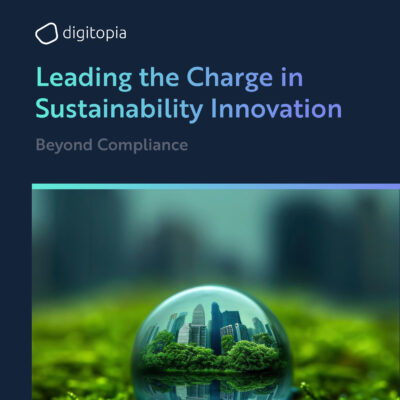
In today’s rapidly evolving business landscape, adhering solely to regulatory requirements for sustainability is no longer sufficient. Companies that limit their efforts to compliance may miss out on significant opportunities for growth, efficiency, and competitive advantage. Instead, businesses should embrace sustainability innovation—integrating sustainable practices into their core strategies to drive transformative change and create long-term value.
Sustainability innovation involves going beyond the minimum regulatory standards to achieve significant environmental, social, and economic benefits. By rethinking operations, products, and business models, companies can leverage innovation and sustainability as a powerful driver of profitability and differentiation. This proactive approach not only enhances compliance but also opens up new markets, attracts environmentally conscious consumers, and builds strong brand loyalty.
Key Insights from the Ebook for Innovation and Sustainability:
- The Limitations of Compliance-Based Sustainability: Compliance-based sustainability focuses on meeting minimum legal standards, which can result in a checkbox mentality. This approach often misses opportunities for innovation and efficiency, leaving companies at a competitive disadvantage and vulnerable to reputational risks.
- Transforming Sustainability Initiatives from Cost Centers to Profit Centers: By integrating sustainable practices into core business functions, companies can turn sustainability from a perceived cost into a significant driver of profitability. This includes strategies like resource efficiency, sustainable product innovation, supply chain optimization, and green finance.
- Disrupting Traditional Models through Sustainability-Driven Innovation: Innovative business models such as the circular economy, shared economy, and service-based models can drive significant environmental, social, and economic benefits. These models create new avenues for growth and competitive differentiation.
- Creating a Culture of Sustainability: Building a strong sustainability culture within an organization ensures that every employee understands the importance of sustainability and actively contributes to the company’s goals. Leadership commitment, employee engagement, education, and transparent communication are key strategies for fostering this culture.
- The Power of Partnerships and Ecosystems: Collaboration with other businesses, NGOs, and government entities can amplify sustainability efforts. Partnerships allow for resource sharing, innovation, increased influence, and risk mitigation, driving greater and more lasting impact.
- Measuring and Communicating Sustainability Efforts: Effective sustainability metrics are essential for driving accountability and transparency. By measuring and tracking performance, companies can identify areas for improvement, set ambitious targets, and demonstrate their commitment to sustainability. Transparent reporting builds trust with stakeholders and fosters continuous improvement.
Case Study:
Acciona – Excellence in Sustainability Reporting Acciona, a global leader in sustainable infrastructure and renewable energy, exemplifies how transparent and effective sustainability reporting can drive significant benefits. By employing comprehensive sustainability metrics and aligning its reporting with international standards, Acciona has enhanced its reputation, increased investor confidence, and driven continuous improvements in operational efficiency. This commitment to transparency and accountability serves as a model for other organizations aiming to enhance their sustainability performance.
Call to Action
To successfully navigate the journey towards sustainability innovation, businesses must adopt a proactive approach that integrates sustainability into their core strategies. Here are some practical steps to get started:
- Set Ambitious Goals: Establish clear, measurable, and ambitious sustainability goals that align with your business strategy.
- Integrate Sustainability into Core Operations: Embed sustainability into all aspects of your operations, from product design and supply chain management to marketing and employee engagement.
- Foster a Culture of Innovation: Encourage a culture of innovation that values sustainability and provides training and resources to empower employees.
- Collaborate and Partner: Build partnerships with other businesses, NGOs, and government entities to amplify your sustainability efforts.
- Measure and Report Progress: Implement robust sustainability metrics and regularly communicate your progress to stakeholders.
Elevate Your Sustainability Strategy with the Sustainability Maturity Index
Explore Digitopia’s Sustainability Maturity Index (SMI) for a comprehensive assessment of your sustainability performance, helping you identify strengths, areas for improvement, and opportunities for innovation.
Download the Full Ebook: To dive deeper into how your business can lead the charge in sustainability innovation, download our full ebook, “Beyond Compliance: Leading the Charge in Sustainability Innovation.” Discover detailed strategies, inspiring case studies, and actionable insights to transform your sustainability initiatives and drive long-term success.
By taking these steps, you can position your organization as a leader in sustainability, driving positive change and achieving long-term success. Embrace sustainability innovation today and join the ranks of forward-thinking businesses that are shaping a more sustainable and prosperous future for all.



